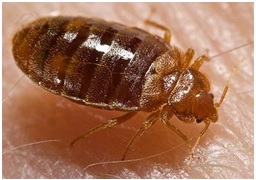|
STOP BED BUGS IN HOTELS SAFELY
WHAT ARE BED BUGS? Bed bugs are small insects that feed on human blood. They are usually active at night when people are sleeping. Adult bed bugs have flat, rusty-red-colored oval bodies. About the size of an apple seed, they are big enough to be easily seen, but often hide in cracks in furniture, floors, or walls. When bed bugs feed, their bodies swell and become brighter red. They can live for several months without food or water.
WHAT DOES A BED BUG BITE FEEL AND LOOK LIKE? Most bed bug bites are initially painless, but later turn into large, itchy skin welts. These welts do not have a red spot in the center like flea bites.
ARE BED BUGS DANGEROUS? Although bed bugs are a nuisance, they are not known to spread disease.
HOW DOES A HOTEL BECOME INFESTED WITH BED BUGS? In most cases, guests carry bed bugs into hotels unknowingly, in infested luggage, clothing, blankets, and pillows. Hotels with high occupancy turnover are especially vulnerable to infestation. There is little that can be done to prevent guests from bringing in bed bugs. No hotel is immune to a bed bug infestation.
HOW DO I KNOW IF A HOTEL ROOM HAS BECOME INFESTED WITH BED BUGS? Have an inspection plan in place so staff can identify a bed bug infestation before guests do. Train your employees to inspect rooms upon vacancy and whenever a guest complains about bed bugs. Your staff should look for living or dead bed bugs, small bloodstains from crushed insects, or dark spots from droppings. They might find bed bug remains on the linens, the mattress and its seams, the bed springs, behind the headboard, in the seams of upholstered furniture, or even between floor boards.
HOW SHOULD A HOTEL RESPOND WHEN A GUEST COMPLAINS ABOUT BED BUGS? Have a plan in place to address bed bug infestations as soon as they occur, and train staff accordingly. When a guest complains, hotels should: •Immediately offer a new room to the guest. •Provide a fact sheet about bed bugs. •Reassure the guest that bed bugs are not known to spread disease. •Offer to launder the guest’s clothes. Potentially infested clothing and bedding should be washed separately in the hottest water and dried on the hottest cycle that is safe for the materials. •Bring in a licensed pest control professional for a complete inspection and treatment of the room. •Don’t use the infested room until a pest control professional certifies it free of bed bugs.
HOW CAN HOTELS GET RID OF BED BUGS? The Department of Health and Mental Hygiene recommends that hotels hire a licensed pest control professional to inspect regularly and quickly address infestations when they occur. Work with your vendor to make sure the following steps are taken when you receive a bed bug complaint: •Thoroughly inspect the guest’s luggage and clothing, as well as the infested hotel room and the new room to which the guest was moved. •If a room is infested, all machine-washable bedding, curtains, rugs, towels, and bathrobes should be cleaned separately in the hottest water and dried on the hottest recommended cycle. Dry clean materials if required. •Scrub mattress seams with a stiff brush to dislodge bed bugs and their eggs. •To remove some bed bugs and eggs, use a heavy duty HEPA vacuum on the mattress, bed frame, furniture, floor and carpet. Pay special attention to cracks and spaces. Discard the used vacuum bag in a sealed plastic bag before using the vacuum in another room. •Place infested mattresses or box springs in zippered plastic covers and store them for at least one year before using them again. •Securely bag all discarded materials to prevent further infestation. •Repair cracks in plaster and loose wallpaper. •Seal cracks around the baseboards of the room completely with caulking material. •Treat the room with special cleaning products and/or pesticides, if necessary. (Pest control products may only be used by professionals licensed by the New York State Department of Environmental Conservation.) •Re-inspect the room periodically to ensure that bed bugs are gone. •Make a visual inspection for bed bugs part of the staff’s cleaning routine every time a room is vacated.
ARE PESTICIDES NECESSARY FOR GETTING RID OF BED BUGS? The best way to get rid of bed bugs is to clean, disinfect, and eliminate their hiding places. Since bed bugs can live for several months without food and water, pest control professionals may recommend the use of a pesticide. Make sure your exterminator: •Uses the least toxic pesticide that will be effective, and avoids “insecticide bombs” and “foggers” since they can spread hazardous chemicals throughout rooms. •Follows the directions on product labels. •Advises your hotel staff to stay out of treated rooms until it is safe to reenter. •Treats mattresses and upholstered furniture with pesticides only if necessary, and only by applying small amounts of pesticides on seams only. Pesticides should never be sprayed on top of mattresses or sitting surfaces.
HOW CAN I KEEP THE HOTEL’S FURNITURE FROM SPREADING INFESTATION? •Never resell or donate infested furniture. •When you throw away an infested mattress, box spring, or other items: • Cut holes in it so it can’t be reused. • Seal it in a large plastic bag to prevent spread of the bed bugs or eggs during transport.
• Tape a sign to it that says, “Infested with Bed Bugs.” |
|


